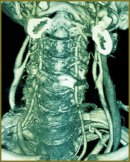
Compression of Great Cervical Vessels in Nodular Goiter as Indication for Thyroidectomy
The aim of the investigation was to study clinical and instrumental manifestations of the compression of carotid arteries and internal jugular veins in nodular goiter, and estimate thyroidectomy as a decompression technique.
Materials and Methods. We examined and operated on 13 patients with bilateral nodular euthyroid goiter, III–IV–V degree. The patients aged from 28 to 58 years. Thyroidectomy was indicated by the compression of trachea in 11 patients and the compression of trachea and esophagus — in 2 patients.
In addition to conventional pre- and postoperative studies the patients underwent duplex scanning of carotid arteries and internal jugular veins, fundoscopy, and contrast multidetector computed tomography (MDCT) of cervical vessels.
Results. All patients in the thyroid above nodules were found to have phlebectasia of one or both internal jugular veins with reduced linear blood flow velocity, while at the level of the nodules and beneath linear velocity increased. Three patients appeared to have common carotid arteries extended and compressed to the outside, and MDCT in one patient revealed total contrast absence of a part of the carotid artery at nodular level and no contrast of the internal jugular vein on the same side. Fundoscopy showed the presence of wide straight veins and narrow arteries. After nodular goiter resection, phlebectasia of internal jugular veins disappeared, linear blood flow velocity normalizing, and dislocated carotid arteries being straightened.
Conclusion. In addition to tracheal and esophageal compression, the compression of great cervical vessels in nodular goiter is no less important indication for thyroidectomy.
- Fadeyev V.V. Nodular goiter: controversial problems and negative tendencies in clinical practice. Klinicheskaya i eksperimental’naya tireoidologiya 2007; 3(2): 5–14.
- Mladentsev P.I., Reznichenko S.G., Mladentseva T.V. Kompleksnoe lechenie tyazhelykh form autoimmunnogo tireoidita. V kn.: Sovremennye aspekty khirurgicheskoy endokrinologii [Complex treatment of severe autoimmune thyroiditis. In: Current aspects of surgical endocrinology]. Saint Petersburg; 2003; p. 156–158.
- Ul’yanova A.E. Kliniko-funktsional’naya kharakteristika narusheniy regionarnoy gemodinamiki i ikh rannyaya diagnostika pri uzlovykh obrazovaniyakh shchitovidnoy zhelezy u zhenshchin. Dis. … kand. med. nauk [Clinical and functional characteristics of regional hemodynamic abnormalities and their early diagnosis in nodular goiter in women. Dissertation for the degree of Candidate of Medical science]. Ivanovo; 2009.
- Troshin V.D., Gustov A.V., Smirnov A.A. Sosudistye zabolevaniya nervnoy sistemy [Blood vessel diseases of nervous system]. Nizhny Novgorod: Izd-vo NGMA; 2006.
- Stepushina О.А., Bolshunov А.V., Smetankin I.G. Combined use of adaptive optics and calibrometry in retinal vein occlusion prognosis in venous occlusion of fellow eye in patients with refraction anomalies. Sovremennye tehnologii v medicine 2012; 2: 109–112.










